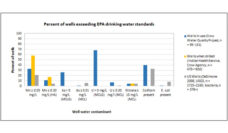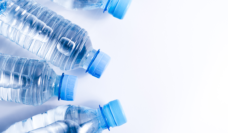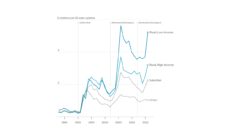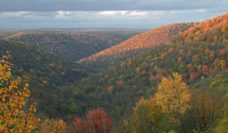The State of Wisconsin has started applying cheese brine to de-ice its roads in the winter to reduce their reliance on salt. From November through March, more than 18 million metric tons of salt are applied to U.S. roads, and the large majority of this salt is concentrated in Northeastern and Midwestern states. Nearly all of it ends up in our water, where the elevated sodium levels threaten the lives of fish, bugs and frogs, and can be detrimental to human health. High levels of road salt in drinking water are dangerous for humans because elevated sodium consumption is associated with increased risk for heart disease and stroke.
Pieper et al. (2018) collected water samples from the state of New York to determine the concentration of road salt in well water. The figure shows the levels of chloride found near salt barns (red), major roads (orange), and away from major roads and salt barns (blue). The closer the distance between a well and a salt barn, the higher the concentrations of chloride in the water. About 82% of wells tested in the study had sodium concentrations above the recommended standard.
This is worrisome not only because people might be consuming more than the suggested dose of sodium, but also because high concentrations of road salt in the water can lead to higher pipe corrosion rates and consequently more likelihood of metals in drinking water. People living in older houses are especially at risk, because they are more likely to have copper and lead plumbing.
The negative consequences of road-salt have inspired states like Wisconsin and New Hampshire to explore alternative de-icing methods such as pickle juice, beet juice and brine solutions that have lower concentrations of salt. While, there is no perfect solution yet, by using de-icing methods with lower concentrations of salt, New Hampshire has reduced its use of salt by 20% and Wisconsin’s use of brine can reduce salt use by at least 30%.
Databyte via Pieper K, Tang M, Jones C. N., Weiss S, Greene A, Mohsin H, Parks J, Edwards M. Impact of Road Salt on Drinking Water Quality and Infrastructure Corrosion in Private Wells. Environmental Science & Technology, 2018.














